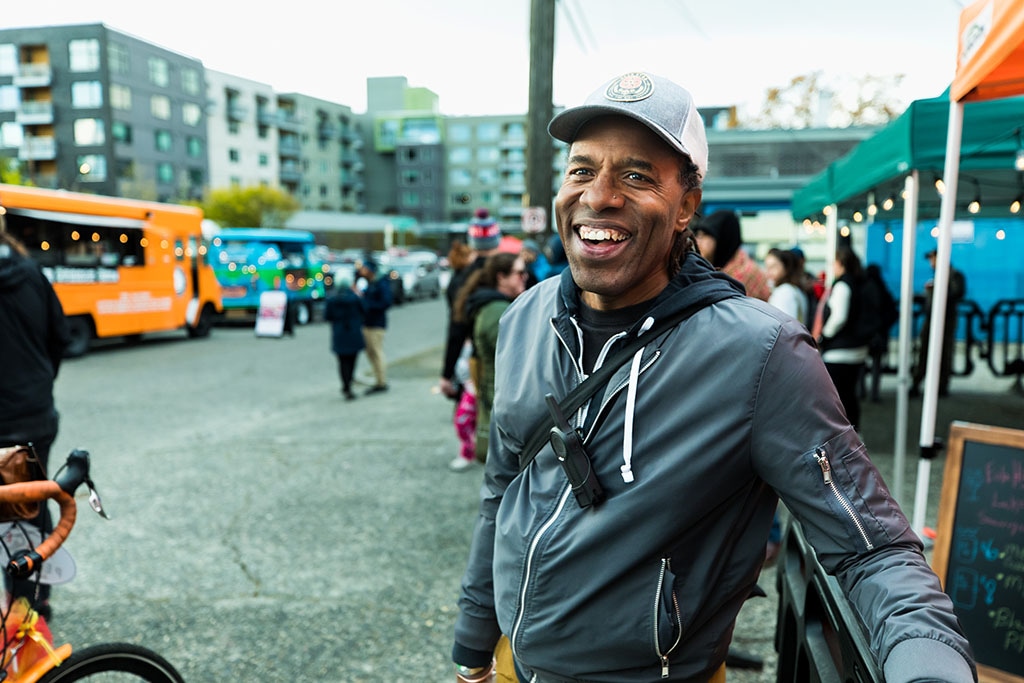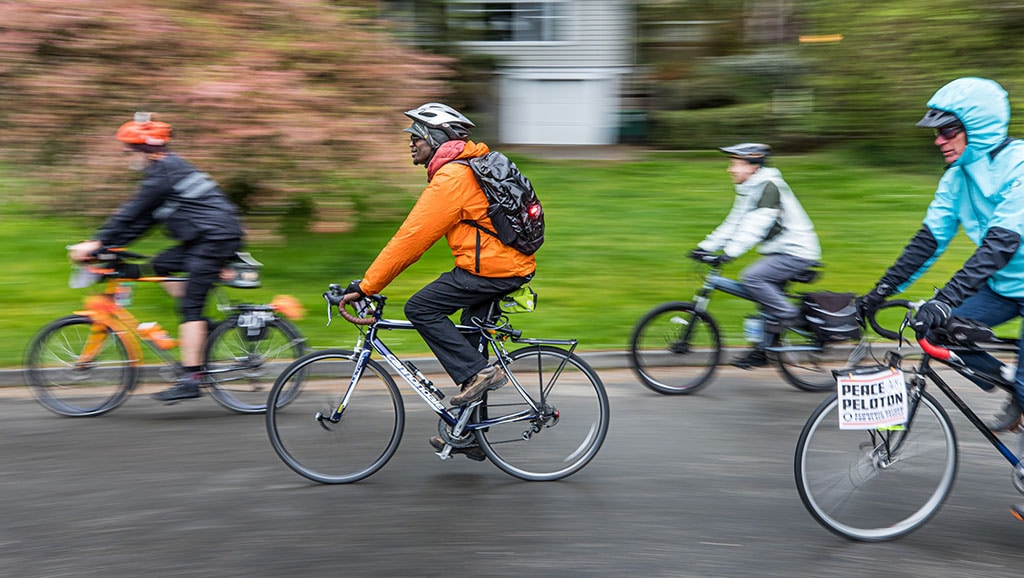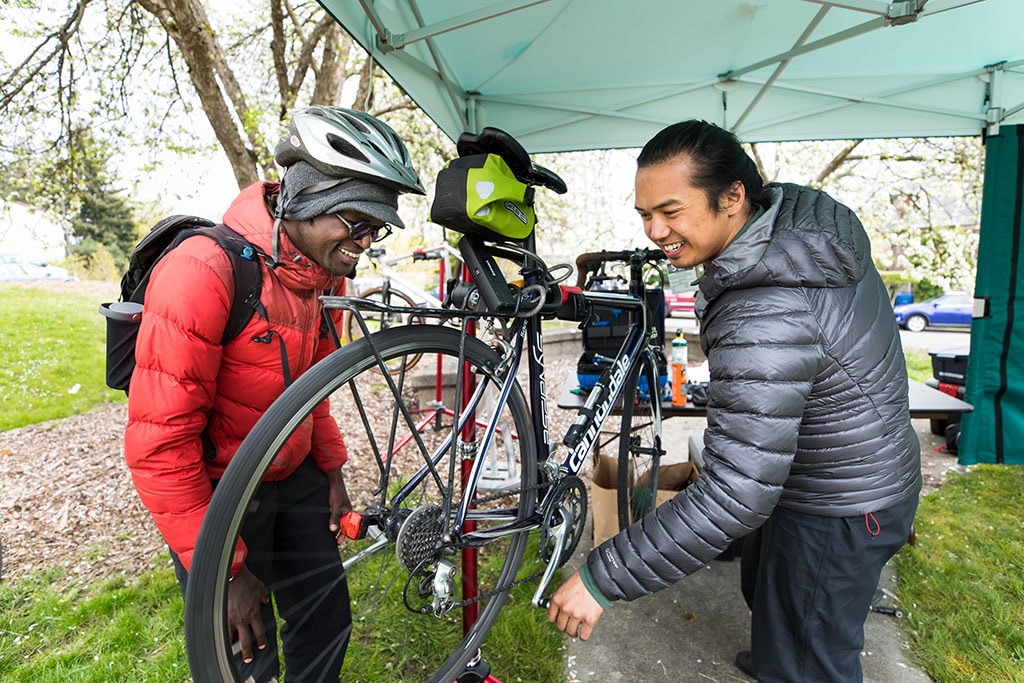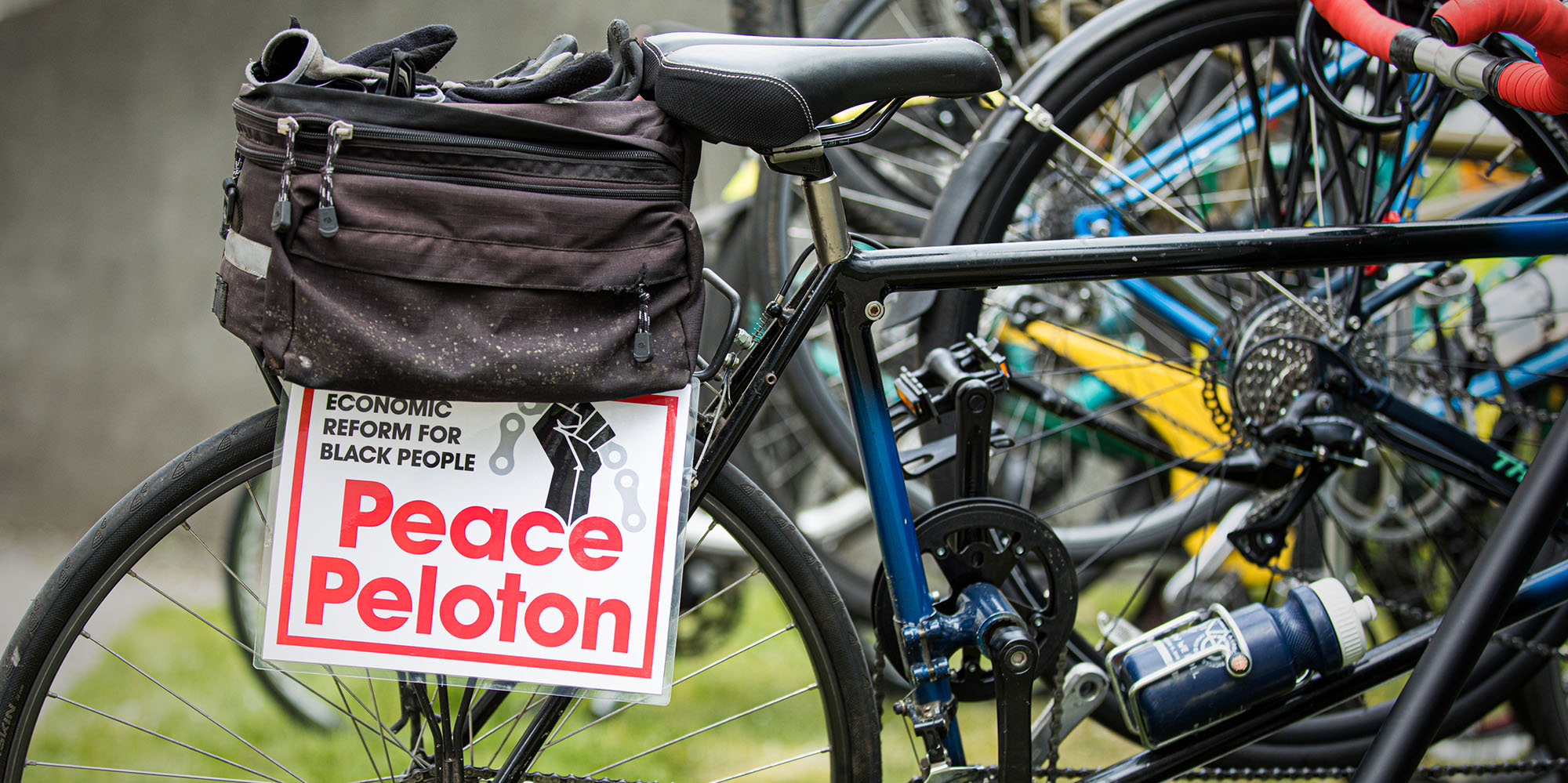“What are you grateful for today?”
Reginald “Doc” Wilson, the founder of Seattle cycling nonprofit Peace Peloton, asks this question a lot. “That’s how he starts every call,” says Steven Durrant, who served as Peace Peloton’s treasurer for its first year. Wilson might express gratitude for something silly or serious, says Durrant, but “that’s always the first sentence.”
It’s there for a reason. In his other role as a life coach, Wilson asked this question to set clients at ease. “People can be intimidated … like, ‘Now I’m going to share my personal feelings with someone who I don’t know, and trust that they’re going to be a good steward of my thoughts and my emotions,’” he explains. “To disarm that, I would always say something like, ‘What good happened to you today? What are you grateful for?’ The tone changes every single time.”
Though seemingly small, that question is what sets the tone for engagement and connection. With Peace Peloton, he’s doing something similar—but on a much larger scale. The cycling group seeks to build prosperity and bolster economic power behind Black-owned businesses, one bike ride at a time, while cultivating an inclusive community of people on bikes that demystifies road cycling.

Peace Peloton held its first ride on June 6, 2020, in response to the murder of George Floyd by Minneapolis police officer Derek Chauvin. In the wake of Floyd’s killing on May 25 of that year, people gathered nationally to protest police violence against Black people, and in Seattle, protesters gathered to share their outrage against institutional racism. The protests occurred everywhere, from a centrally located occupied protest zone where the uprising never stopped to the quietest corners of the city, where folks gathered on street corners and Black Lives Matter signage covered both murals and pandemic-shuttered businesses.
Amid this moment of resistance, Wilson and fellow Seattle cycling-community mainstay Ed Ewing decided to channel the energy of protest into a bike ride in Seattle, inviting cyclists on a 10-mile route to effect change by raising awareness and creating community action. Paul Tolmé, content strategy and media relations manager for Cascade Bicycle Club, was on that ride, and remembers being struck by “a sense of excitement and community and camaraderie with a goal.”
Apparently, hundreds of riders felt the same way, including Durrant, who came out to show support. Wilson hadn’t expected 450 people to show up—but they did, and they wanted to do more to fight against systemic injustice. The ride was planned as “kind of a one-time thing,” but Wilson realized there was momentum there.
“I enjoy cycling, and I wanted that to be a part of any movement I launched and implemented,” says Wilson, adding that a bicycle “is a very disarming tool that brings people together.”
Making a deeper commitment to social justice through Seattle’s bike community made sense for Wilson, a longtime cyclist who first started organizing rides when he transitioned from mountain biking to road cycling in Washington, D.C., before coming to Seattle. The idea behind those group rides, says Wilson, was to provide an antidote to the “intimidation factor” that often faces new riders trying road cycling for the first time. Now, Wilson had the chance to do something similar, with a larger purpose than simply demystifying a sport unfriendly to beginners.
So in 2020 he put his coaching business on hold, applied for nonprofit status and went about the intricate work of transforming protest into “sustainable and scalable” work. Durrant offered up administrative support. And Wilson landed on the idea that would inform the organization’s stated mission: “We spark entrepreneurial opportunities and growth for new and existing businesses and motivated humans—who happen to be Black.”
“A lot of the other reforms that we were talking about in the beginning [of Peace Peloton and uprisings against police violence across the country], like health care reform and prison reform, required some sort of legislation,” Wilson explains. But addressing racial economic inequality did not. “Economic reform just required the willingness of someone to reach in their pocket and exchange their legal tender for the goods and services of whomever they were supporting.”

For Peace Peloton today, that exchange takes the form of three initiatives: Fresh Air Rides; Night Markets; and Barbecue, Bikes and Beer, all of which drive economic reform through partnerships with small and Black-owned businesses in the Seattle area whose owners are invited to speak to ride participants about their work.
The group’s mission resonates with Kevin Kibet, who is a frequent Peace Peloton ride participant—often with his two kids, ages 7 and 10, in tow. They’ve traversed north Seattle with Peace Peloton. Kibet was drawn to the opportunity to support Black-owned businesses as “a concrete way to really say, ‘Black lives matter,’ and so, in that sense, ‘Black businesses matter’ … it was a concrete way I can live out my values.”
Fresh Air rides, Peace Peloton’s anchor program, are group rides that begin and end at locations where participants can engage with Black-owned businesses or organizations. “We allow commerce to happen, and we invite the owners or the heads of the organizations to come out and speak to our audience … to invite them back, give them a reason to come back,” explains Wilson. “That’s the sustainability part. It’s not feasible for us to bring 300 people to your business every week, so we want to work with these organizations to figure out a way to … keep people coming back.”
The quarterly Barbecue, Bikes and Beer events, bring this aim to Black-owned barbecue joints and tap rooms, while the monthly Night Market highlights local creators. The latter began as a holiday market on a rainy December evening in 2020. “It was hard to get people out, but still, we championed through,” says Wilson. Wilson’s efforts paid off: The Night Market held this past May drew 2,300 attendees, as well as musicians, food vendors, artists and makers.
Peace Peloton is also expanding its reach across state lines, with an upcoming tour of Fresh Air rides this summer in Minneapolis; Chicago; Washington, D.C.; Atlanta; Oakland, California; and Los Angeles. Each community ride will start and end at the site of a business or local institution that is Black-owned or has Black leadership.
Tolmé has observed the group’s growth so far and hopes Peace Peloton will continue to spread beyond the Pacific Northwest. “It is a very powerful statement and a great step in the right direction as we, as bicyclists, who are part of American society and culture, use our bicycles and our interest in bicycling for good—not just for health and recreation and fun rides, but riding and spending our dollars to help others. In this case, especially now, communities of color, businesses of color, have been impacted due to the pandemic and all the economic difficulties it caused,” he says.

Wilson is fostering community with every ride, and, though they aren’t necessarily advertised as such, Durrant says the rides have drawn riders who aren’t regular cyclists, but “find some community and some comfort riding with each other and get to explore parts of the city that they might not know about.”
Though Wilson acknowledges that competitive cycling certainly has its place, it isn’t with Peace Peloton, where, he says, “I wanted to eliminate that intimidation factor.”
He makes a practice of pairing newer cyclists with experienced riders, and the group’s commitment to inclusivity extends to “making sure that we’ve got a safe situation for everybody and that everybody’s got an escort of some sort if they have a mechanical issue or they fall behind,” says Durrant.
This kind of openness is something Wilson would like to see flourish in the outdoors community more broadly. He recalls the dissonance, during his childhood, of seeing commercials featuring outdoor activities like hiking and canoeing. “As a young Black kid growing up in Gary, Indiana, that was so out of reach for me,” he says. “The people on the commercial didn’t look like me, and I’m like, ‘Canoes? We can’t canoe, hike. There are no mountains here. That’s not for us.’ But what I would hear my parents say is: ‘Go outside’—just the difference between the ‘outdoors’ and the ‘outside.’ ‘Go outside and play.’ And we were like, ‘Yeah, that doesn’t require much except the energy it takes to open the door and be on the other side of it.’ So now we are successfully outside, and what we do in our time outside is up to us.”
Truly welcoming everyone outside means building alternatives to cycling’s history of gatekeeping—and that of outdoor recreation more broadly. The world of outdoor activity is full of historically white spaces, and exclusionary ideas about who’s allowed to be a cyclist, especially when it comes to race, economic status, body size and gender. In practice, intentionally deviating from these damaging norms can require adaptation and creativity. For example, like many community-oriented cycling programs, Peace Peloton rides are no-drop, meaning no one gets left behind. But on one ride, Wilson recalls, he had to “refresh” this policy after one cyclist got a flat, and everyone stopped and waited. “So, we’ve got 200 people on the side of the road, waiting for our sweeps to fix this tire, and I believe going forward this year, we don’t need to stop the whole 200,” says Wilson. “We can have a group of people wait for them and then ride with them. So that too is no-drop. But I was just a staunch ‘No, if somebody gets a flat tire, we’re all going to stop and wait’ … There’s a better way of doing it.”

It was a learning experience, but one that reveals Wilson’s openness to learning as he goes. “He’s got a lot of energy and he’s got some really interesting ideas and perspectives—things he wants to develop and get done,” says Durrant. “He pushes pretty hard to get on with those things and if something doesn’t pan out … he moves on. He doesn’t hold any grudges. He just figures out how to apply that really positive energy in a creative way to the next thing.”
Wilson and Durrant both stand by the no-drop philosophy, in line with a ride atmosphere Kibet describes as welcoming and kid-friendly, with “spaciousness just to be.” As Wilson puts it: “If you get dropped, you’re going to feel like, ‘Oh, I’m not coming back here.’” Peace Peloton’s entire model is about coming back, establishing relationships between cyclists and the cities where they live and building client bases and financial momentum behind Black-owned businesses. It shows what can happen when the energy of protest is transformed into broad-based, lasting change.
“Our origins were protests,” says Wilson, acknowledging that protests can bring awareness to an issue and create an energetic jumping-off point into sustained activism that can carry on across the country and into the future. “Peace Peloton is still here, and we’re still growing,” he says.
It’s something to be grateful for.
Editor’s note: REI partners with Peace Peloton to provide financial sponsorship, in-kind benefits and support for events the organization host, among other efforts.
